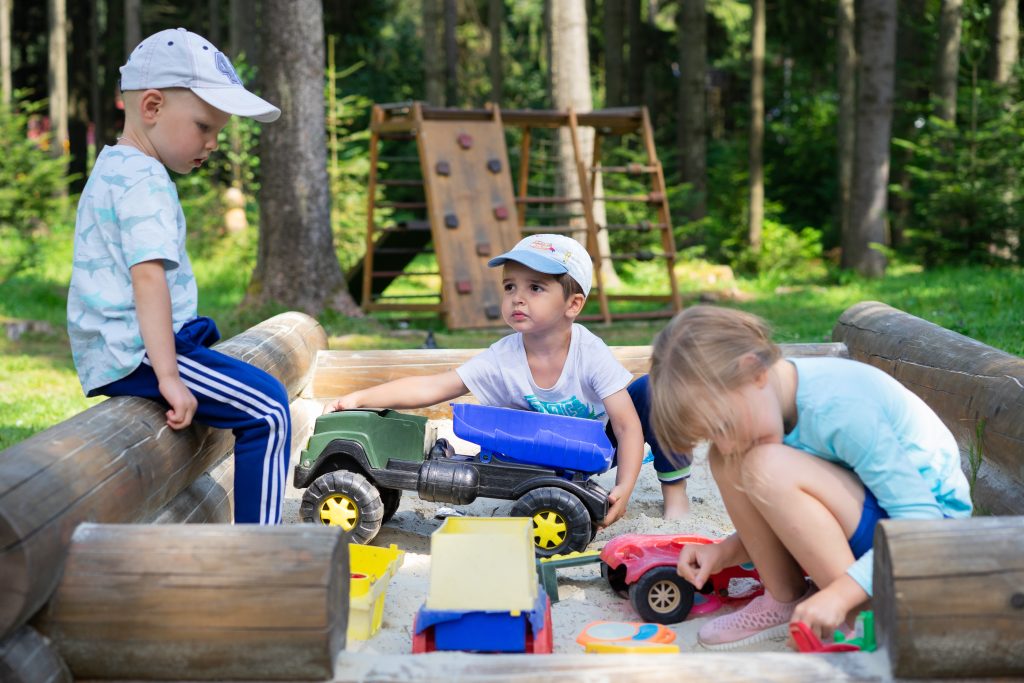
As a child, there was nothing quite like the feeling of running around outside, feeling the fresh air on your face and the freedom to explore the world around you and as it turns out, this sense of curiosity and exploration is incredibly important for young children’s development.
Outdoor play has long been recognised as a vital component of early years education. It allows children to learn about the natural world, develop physical skills, and engage their imaginations in a way that no structured activity can replicate.
However, there has been growing pressure to steer children away from the great outdoors and towards more structured activities or screen time in recent years. But as parents, educators, and policymakers, it’s important that we keep sight of the incredible value that outdoor play can bring to a child’s life.
Physical Development
A child’s physical development is crucial to their overall growth and well-being. There is a multitude of outdoor activities that can help children develop and build their motor skills, coordination, and balance. Exploring nature through hikes or walks can offer a unique opportunity to adjust to uneven surfaces and improve their agility and balance while climbing over logs. Playing catch with a ball or frisbee can be a fun way to enhance hand-eye coordination and improve upper-body strength. Even traditional games such as tag or hopping can encourage physical activity and help children develop their physical abilities.
The benefits of physical development not only improve a child’s health and fitness but can also positively affect their self-confidence and social skills.
Cognitive Development
The cognitive development of young children is a crucial aspect of their growth and learning journey. While classroom education is essential, outdoor play also plays a significant role in enhancing cognitive development.
Being in the natural environment presents numerous opportunities for children to develop and expand their skills. Engaging in games that require problem-solving, like hide-and-seek, treasure hunts, and identifying animal tracks, can further sharpen their abilities.
Activities like building nests with natural materials or using binoculars to track animals help to stimulate their cognitive abilities while providing an enjoyable experience. As such, it is essential to encourage children to play and explore the great outdoors to promote their cognitive development.
Social Development
Social development is one of the most important aspects of early years education. While physical and cognitive activities are essential, outdoor play also provides an excellent opportunity for children to build their social skills.
Engaging in cooperative games such as tug-of-war and relay races can help them work together to achieve a common goal while developing respect for each other’s abilities. Working with others on outdoor projects or exploring nature as part of a group encourages teamwork and fosters empathy and understanding.
Educators must provide plenty of opportunities for young children to engage in outdoor play activities as it promotes physical, cognitive, and social development and helps them grow into confident individuals who will be ready to take on the world.
Creative Play Ideas
Outdoor play activities are not limited to traditional games like tag, hopscotch, and catch. There are a variety of creative play ideas that allow children to explore their imagination while engaging in physical activity.
Set up an obstacle course using everyday items around the yard, such as hula hoops and tyres for them to jump through, or create your own mini-golf course with cups and makeshift holes. Planting flowers in the garden can provide an opportunity for them to learn about nature while having fun.
The possibilities are endless when it comes to outdoor play activities! Educators should think outside the box and devise creative ways to engage young children outdoors to reap the full benefits of outdoor play.
Safety Tips & Resources
While outdoor play is an essential part of early years education, it is also important to ensure children’s safety at all times. Educators should always be mindful of the potential risks that can come with outdoor activities and take necessary precautions.
It is important to ensure that children are dressed for the weather, wear appropriate footwear, and bring sun protection.
Conclusion
Outdoor play is an essential part of early years education and has many benefits for young children’schildren’s physical, cognitive, and social development. It offers a unique opportunity to explore the natural environment and develop their motor skills, coordination, balance, problem-solving abilities, self-confidence, teamwork skills, empathy and understanding.
Engaging in creative activities like obstacle courses and mini-golf can provide a fun way to boost physical activity while developing cognitive skills. Encouraging outdoor play also provides important social development opportunities, as cooperative games can help children work together to achieve a common goal while building respect for each other’s abilities.
It is vital that educators provide plenty of opportunities for outdoor play in early years education as it fosters healthy growth and development in young children while helping them become confident individuals ready to take on the world.
Thank you for getting this far, and we hope you have enjoyed reading about The importance of outdoor play in early years education. If you don’t already follow us on Facebook, please head over and check us out.
